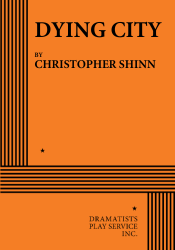THE STORY: A year after her husband’s death in Iraq, Kelly, a young therapist, confronts his identical twin brother, who shows up at her apartment unannounced.
“Anyone who doubts that Mr. Shinn is among the most provocative and probing of American playwrights today need only experience the creepy, sophisticated welding of form and content that is DYING CITY. Anyone who has followed the career of Mr. Shinn, who is in his early thirties, knows that he uses tidy dramatic formulas the better to frame the defiant messiness of human lives. He hooks you with tantalizing exposition—and the lure of a wham-bang solution—and then leaves you alone with your racing mind in a forest of ambiguities. On one level DYING CITY is as satisfyingly spooky, crisp and corny as an episode of Alfred Hitchcock Presents. But in answering the plot’s whodunit-type questions, it spawns a wriggling host of other, deeper questions that stay with you into the night…Unlike so many contemporary plays DYING CITY raises obvious, important issues in any-thing but obvious ways.” —The New York Times.
“Trying to make sense of what is left behind envelops DYING CITY, Christopher Shinn’s remarkable tale of loss and how two very different people handle their grief. The play is personal, intimate even, yet its themes could not be more all-encompassing and its emotional impact more affecting…In this subtle and revealing play, Shinn is able to take the political and humanize it—transforming the stuff of daily news stories into a devastating statement on the unforeseen and often hidden consequences of war.” —Associated Press.
“The finest new American play I’ve seen in a long while…DYING CITY is a political play and also a psychodrama about what Arthur Miller called the politics of the soul. It’s about public conscience and private grief, and real and symbolic catastrophes.” —New York Observer.
